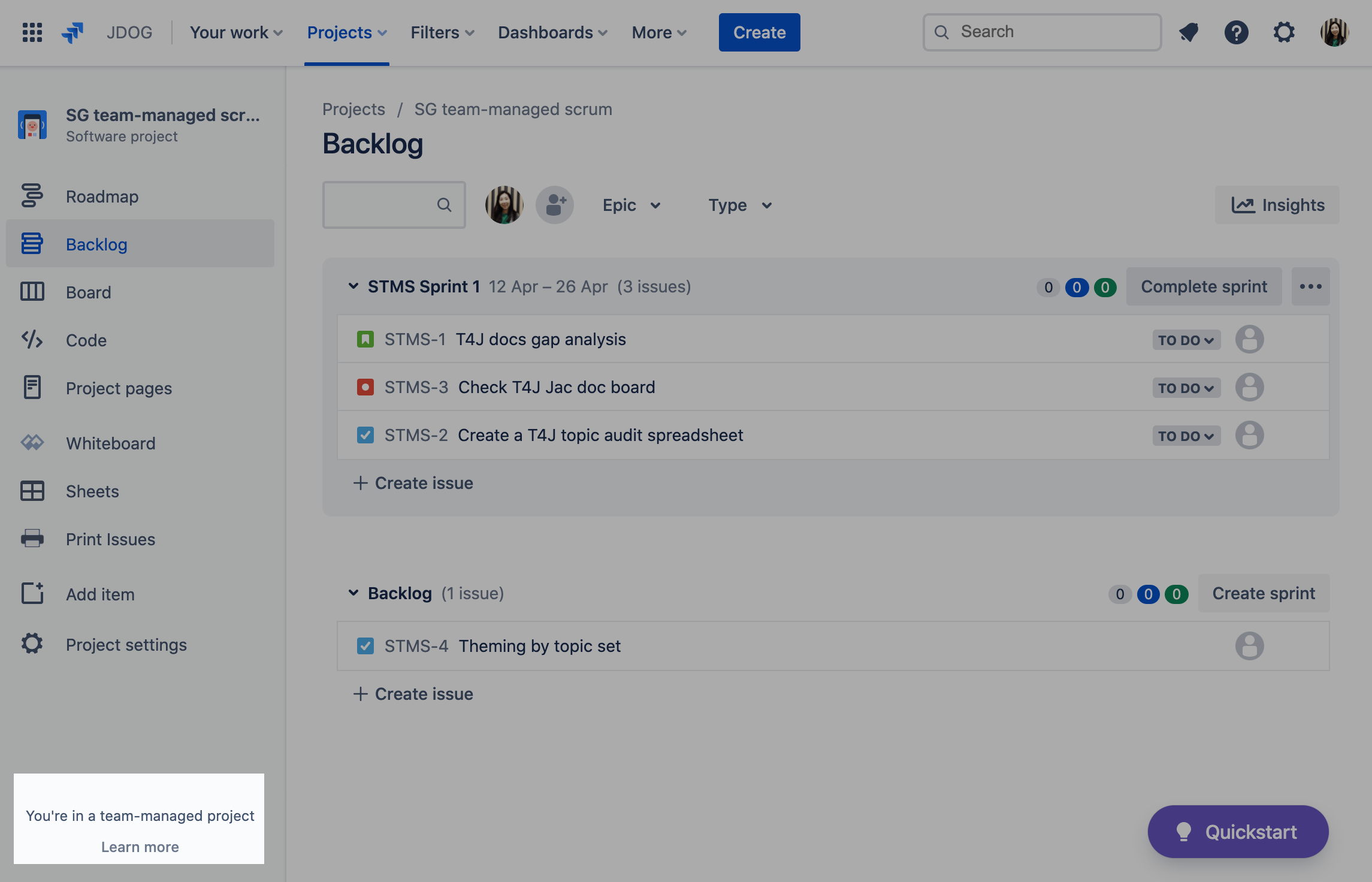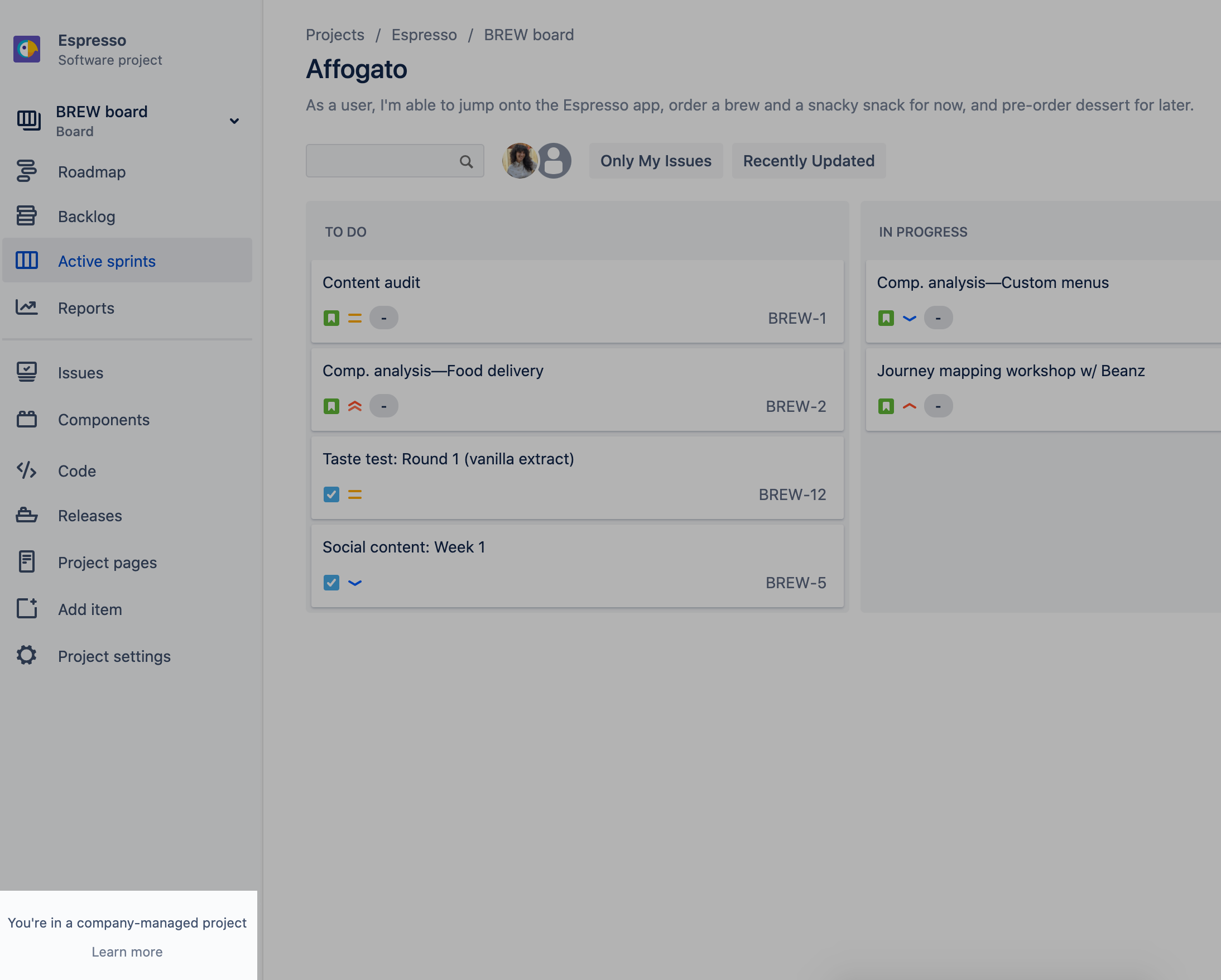Team-managed and company-managed projects
What are team-managed and company-managed projects?
Projects in Jira can be created as either team-managed or company-managed projects (formerly next-gen and classic). The core functionality of these project types are the same, but there are key differences you should know in order to decide what's right for your team.
The difference between team-managed and company-managed projects
Team-managed
Set up and maintained by anyone on the team, team-managed projects are ideal for autonomous teams who want to control their own working processes and practices in a self-contained space. In addition, team-managed projects have simpler project configurations and give project admins more control over setup without involving a Jira admin (unlike company-managed projects, where one must configure schemes and screens).
Company-managed
Set up and maintained by Jira admins, company-managed projects are the best choice for teams who want to work with other teams across many projects in a standard way, such as sharing a workflow. Company-managed projects require a Jira admin to configure screens and schemes that projects are based on. Hence, company-managed projects have greater complexity in project configuration and the ability to standardize workflows across projects that team-managed projects don't have. When a Jira admin changes a scheme or screen, every company-managed project that uses that configuration changes accordingly.
Configurations and features
View the list below to learn the key differences between team-managed
and company-managed projects and determine which best suits your needs.
Team-managed | Company-managed |
|---|---|
Set up and maintained by your team. For teams who want to control their own working processes and practices in a self-contained space. Mix and match agile features to support your team as you grow in size and complexity. | Set up and maintained by your Jira admins. For teams who want to work with other teams across many projects in a standard way. Encourage and promote organizational best practices and processes through a shared configuration. |
Simplified configuration Get up and running quickly, with a simplified configuration. | Expert configuration Benefit from complete control with expert configuration, customization, and flexibility. |
Anyone on your team can set up and maintain | Set up and maintained by your Jira admins |
Settings do not impact other projects | Standardized configuration shared across projects |
Customizable workflows, statuses, and issue transitions | |
Access level permissions | Detailed permission schemes |
Essential features A modern Jira experience for teams who don't need advanced features. | Advanced features All the power and features that Jira Software is known for. |
Basic roadmaps | Advanced Roadmaps (Premium only) |
Only show your project's issues on your board | Pull in issues from other projects on your board |
Standard filters | Custom quick filters |
Single active sprint | Parallel sprints |
Essential agile reporting | Comprehensive agile reporting |
How to choose between a company-managed or team-managed project
The fundamental difference between the two project types is how they are administered and whether that occurs at the team level or at a company/Jira admin level.
Choose a team-managed project if:
- Your team wants easier project configuration to get started more quickly.
- You want a self-contained space to manage your team's work.
Choose a company-managed project if:
- You want to standardize configuration across multiple projects in your organization.
- You require advanced features that aren't available in team-managed projects.
Can I migrate a project if the type of project does not work for my team?
It's possible that your chosen project type is not working for your team. Or perhaps there is a new initiative in your organization that requires your teams to change the way they collaborate. No matter the reason, you do have the ability to migrate between team-managed and company-managed projects.
This is useful to you if:
- Your team currently works in a company-managed project, and you want to migrate to team-managed projects.
- Your team gave team-managed projects a try, found that it didn't suit how you work, and you want to move your issues to company-managed projects.
Is my project team-managed or company-managed?
You can tell the difference between team-managed and company-managed projects by going to your project sidebar.
In team-managed projects, the bottom-left of the sidebar has the message: You're in a team-managed project.

In company-managed projects, the bottom-left of the sidebar will show You're in a company-managed project.

Pros and cons of team-managed and company-managed projects
Below is a table of benefits and possible disadvantages of team-managed and company-managed projects.
Project type | Pros | Cons |
|---|---|---|
Team-managed | Better for smaller customers | Hard to scale or suggest to be kept on a separate cloud instance |
Team-managed | Simple project configurations give project admins control over setup without the need for a Jira admin | There can be issues with admin management when there are many custom fields, separate schemes, and workflows |
Team-managed | Migration between team-managed and company-managed projects is possible | If you use custom fields in your team-managed project, a Jira admin needs to recreate the fields and add them to screen schemes and field configurations in your company-managed project. Custom field data will need to be recreated, otherwise, it will be lost. |
Company-managed | Standardized configuration shared across projects | Configuration can be more complex |
Company-managed | Consistent workflows on all projects | All teams will be affected by changes to settings and workflows |
Company-managed | Migration between company-managed and team-managed projects is possible | Sprints Completed, planned, or active sprints won’t move from a company-managed project to a team-managed project. The issues that were in your company-managed project will be added to the backlog of your team-managed project. Components Component fields are unique to every project in Jira. If you migrate issues with completed component field information, you will lose this data. |
Was this content helpful?
Connect, share, or get additional help
Atlassian Community